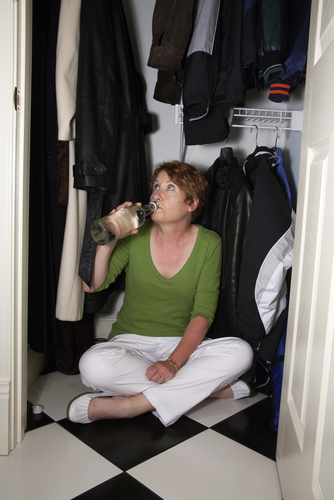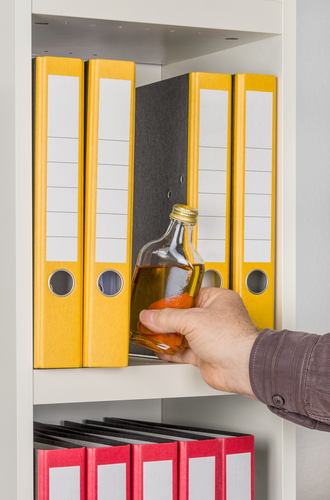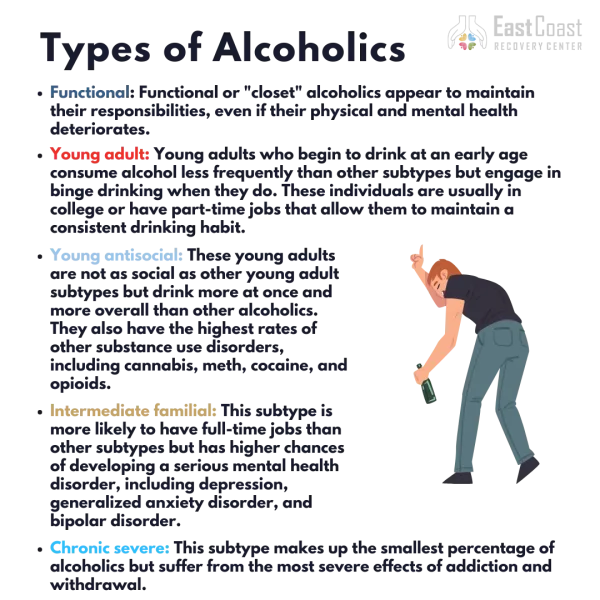Sometimes, it’s easy to spot if someone has been drinking alcohol or has an addiction. They might be stumbling, slurring their speech, or miss out on events or functions unless there’s something to drink. However, there’s a particular group of drinkers who want to hide the fact they’ve been drinking regularly or that their drinking habits have affected their personal lives at all. Sometimes, these “closet alcoholics” might not know they have a problem.
This short article covers what closet alcoholics are, signs of someone hiding excessive drinking, types of alcoholics, ways to approach and support a closet alcoholic, distinctions between alcoholism and alcohol use disorder, and various treatment options for alcohol addiction.

What Is A Closet Alcoholic?
A closet alcoholic is someone who either tries or successfully conceals their drinking habits, often from friends, family, or partners. It can be challenging to identify closet drinkers, especially if they hold a full-time job, possess strong social skills, or maintain long-term relationships. This contrasts the more stereotypical image of an alcoholic who struggles to keep a job or balance personal life with drinking.
Those hiding their drinking usually aim to avoid the alcoholic label, even when socializing with others who drink or party. Some may hide their habits to project an image of strength, confidence, or composure, steering clear of potential embarrassment associated with relying on alcohol. They might feel pressure to maintain constant functionality at work, school, or other responsibilities.
For others, past experiences with irresponsible drinking within their family or personal history might drive them to conceal their drinking habits. They may wish to prevent stirring up negative emotions or memories in their relationships with parents, siblings, or intimate partners.
Danger Of Being A Closet Alcoholic
The biggest problem for closet alcoholics is that they often don’t seek help because they believe they don’t need it. According to the DSM-5-TR, a tool used by physicians and mental health professionals to identify and diagnose mental health disorders, individuals must be unable to control or discontinue their alcohol intake despite it impacting their personal lives. Some closet alcoholics might use this definition (even though it’s just a basis) to exclude themselves from the label.
Other closet drinkers might even be labeled by others or themselves as “high-functioning alcoholics” if they can keep up with personal responsibilities, even if it’s taking a toll on their physical and mental health in the background.
Recent studies found that only 7% of people with a qualifying alcohol use disorder (AUD) receive addiction treatment. That’s only around 2 million people receiving treatment out of the almost 30 million people aged 12 and up with an AUD. Almost every addiction specialist agrees that the longer a substance use disorder continues, the more detrimental it can be to their health and recovery process.
Read more: Alcohol As A Coping Mechanism: Signs, Dangers, & Treatment

Obvious & Hidden Signs Of A Closet Drinker
Some of the most common signs of a closet alcoholic include:
- Stashing or hiding alcohol from family members, including empty bottles and boxes.
- Drinking vodka over other types of alcohol because of its clear color and minimal odor.
- Some closet drinkers might use water bottles, soda bottles, travel mugs, or insulated bottles to hide their alcohol.
- Lying or downplaying the amount of alcohol they drink.
- Using mouthwash, chewing gum, or brushing their teeth to mask the smell of alcohol.
- Disappearing from parties, events, or gatherings to drink without anyone noticing.
- Some closet alcoholics might openly drink if others don’t know they’re drinking more than everyone else in the group.
- They appear anxious or irritated if they’re not drinking, even if others aren’t aware they’re usually intoxicated.
- Lying about if they’re hungover or currently drinking.
- Lying about their whereabouts if they’re at a bar, pub, brewery, or other place that sells alcohol.
- Arriving late to places or hanging out in their car before events.
- Leaving early from an event or party to drink.
Some closet alcoholics might not attempt to hide their drinking habits at all. These signs can help you identify someone who isn’t afraid to display their drinking but is unaware of the potential impacts on their life.
- Some closet alcoholics might be unable to control their drinking habits but think nothing of it if they only drink at parties or gatherings (even if they go to multiple parties each week).
- Some closet alcoholics might be able to drink excessive amounts of alcohol without appearing incredibly intoxicated. This might convince them or others they can drive after drinking.
- They might appear happy or positive while they’re drinking until someone mentions or suggests they slow down their drinking for a night. If addressed, they might become agitated, aggressive, emotional, or ashamed.
- They might drink before events to hide their drinking amount (also called pre-gaming).

Types Of Alcoholics
Closet alcoholics can fall under one of the five subtypes of people with alcohol use disorder.
- Functional: Functional or “closet” alcoholics appear to maintain their responsibilities, even if their physical and mental health deteriorates.
- Young adult: Young adults who begin to drink at an early age consume alcohol less frequently than other subtypes but engage in binge drinking when they do. These individuals are usually in college or have part-time jobs that allow them to maintain a consistent drinking habit.
- Young antisocial: These young adults are not as social as other young adult subtypes but drink more at once and more overall than other alcoholics. They also have the highest rates of other substance use disorders, including cannabis, meth, cocaine, and opioids.
- Intermediate familial: This subtype is more likely to have full-time jobs than other subtypes but has higher chances of developing a serious mental health disorder, including depression, generalized anxiety disorder, and bipolar disorder.
- Chronic severe: This subtype makes up the smallest percentage of alcoholics but suffer from the most severe effects of addiction and withdrawal.
Read more: What Is Crossfading & How It Can Lead To Polysubstance Addiction
Alcoholic Vs. Alcohol Use Disorder
“Alcoholic” is a term commonly used in everyday language and can lack the precision and depth of a clinical diagnosis. “Alcohol use disorder” is a clinical term that recognizes problematic drinking as a spectrum and disease, allowing for a more thorough assessment and understanding of an individual’s relationship with alcohol from a medical and psychological standpoint and labeling someone as an alcoholic groups them with their disease as if they were the same or both the problem.

How To Approach A Closet Alcoholic
Closet alcoholics may not know their alcohol abuse affects them or those around them. So, it’s important to approach them with love, care, and patience. Here’s what you can do.
- Avoid stereotypes and labels: Don’t call your loved one an alcoholic or addict. These terms can hurt them and cause them to raise walls and be less susceptible to discussion.
- Focus on the drinking: Don’t attack your loved one’s personality or traits. Always focus on their drinking habits and how you’ve noticed its impact on them and you. Use “I” statements, like “I’m worried about how your alcohol use is affecting our relationship.”
- Focus on their well-being: Overall, you’re usually concerned with your loved one’s health and safety. Talk to them about how their health is changing or perhaps how they’re losing interest in the hobbies they used to enjoy.
- Show empathy: If your loved one feels attacked or judged, they might shut down or become irritated, bringing the conversation nowhere productive. Always maintain an empathetic and understanding tone that will help them feel safe, comfortable, and more open to your point of view.
Alcohol Addiction Treatment Methods
Once you’ve talked to your loved one and discussed the possibility they might be a closet alcoholic, it’s important to have some next steps and goals prepared. We’ve separated these treatment options by their level of structure and care.
- Lowest levels of care: If your loved one’s alcohol abuse isn’t very severe, but they still want to get ahead of the game and avoid dependency, we recommend an addiction outpatient program. Most clients attend treatment for around 20 hours a week, getting involved in one-on-one therapy sessions, group discussions, and experiential activities.
- Mid-tier levels of care: If you or a loved one’s alcohol use disorder requires a higher level of structure and care, we recommend an Partial Day or Day Treatment program. Clients usually attend these programs for around 20 to 30 hours a week.
- Highest level of care: If an alcohol use disorder has gotten to the point where an individual suffers from withdrawal symptoms when they try to quit or cannot quit, we recommend a detox program followed by a residential treatment program. Clients are usually at these programs full time as they are monitored during withdrawal symptoms and work on coping skills to deal with intense cravings and mental health challenges.
Contact East Coast Recovery Center
If you or someone you know is a closet alcoholic or has an alcohol use disorder, contact East Coast Recovery Center in Boston, Massachusetts. Our addiction treatment team is ready to help you or your loved one overcome this debilitating substance use disorder and get you back on track.
Some of our founders and staff members have struggled with addiction themselves and are dedicated to helping those like them find true wellness and leave these consuming addictions behind. Call today, and one of our admissions agents can help you get started or answer any questions.










